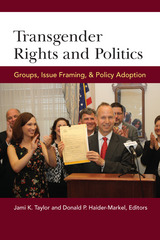
The Politics of Sexuality in Latin America presents the first English-language reader on LGBT politics in Latin America. Representing a range of contemporary works by scholars, activists, analysts, and politicians, the chapters address LGBT issues in nations from Cuba to Argentina. In their many findings, two main themes emerge: the struggle for LGBT rights has made significant inroads in the first decade of the twenty-first century (though not in every domain or every region); and the advances made were slow in coming compared to other social movements.
The articles uncover the many obstacles that LGBT activists face in establishing new laws and breaking down societal barriers. They identify perhaps the greatest roadblock in Latin American culture as an omnipresent system of “heteronormativity,” wherein heterosexuality, patriarchalism, gender hierarchies, and economic structures are deeply rooted in nearly every level of society. Along these lines, the texts explore specific impediments including family dependence, lack of public spaces, job opportunities, religious dictums, personal security, the complicated relationship between leftist political parties and LGBT movements in the region, and the ever-present “closets,” which keep LGBT issues out of the public eye.
The volume also looks to the future of LGBT activism in Latin America in areas such as globalization, changing demographics, the role of NGOs, and the rise of economic levels and education across societies, which may aid in a greater awareness of LGBT politics and issues. As the editors posit, to be democratic in the truest sense of the word, nations must recognize and address all segments of their populations.

While medical identification and treatment of gender dysphoria have existed for decades, the development of transgender as a “collective political identity” is a recent construct. Over the past twenty-five years, the transgender movement has gained statutory nondiscrimination protections at the state and local levels, hate crimes protections in a number of states, inclusion in a federal law against hate crimes, legal victories in the courts, and increasingly favorable policies in bureaucracies at all levels. It has achieved these victories despite the relatively small number of trans people and despite the widespread discrimination, poverty, and violence experienced by many in the transgender community. This is a remarkable achievement in a political system where public policy often favors those with important resources that the transgender community lacks: access, money, and voters. The Remarkable Rise of Transgender Rights explains the growth of the transgender rights movement despite its marginalized status within the current political opportunity structure.

READERS
Browse our collection.
PUBLISHERS
See BiblioVault's publisher services.
STUDENT SERVICES
Files for college accessibility offices.
UChicago Accessibility Resources
home | accessibility | search | about | contact us
BiblioVault ® 2001 - 2024
The University of Chicago Press









